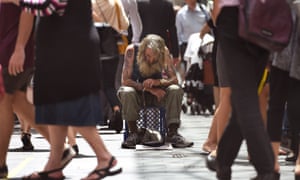Extract from The Guardian
Country is less fair,
less safe and has more people in prison than comparable nations, says
Community Council of Australia
A man
begging in Sydney. The mantra of budget repair has become harmful
because it promotes individual economic gain at the cost of a
resilient society, the report says. Photograph: William
West/AFP/Getty Images
Thursday
27 October 2016 08.12 AEDT
A
report by the Community Council of Australia has shattered
perceptions that Australia is a country of the “fair go”, finding
it is less fair, less safe, and with a higher incarceration rate than
comparable OECD nations.
The
Australia We Want report was released on Thursday before a National
Press Club address by the council’s chairman and World Vision
Australia’s chief executive, Tim Costello. It paints a damning
picture of a society characterised by rising
inequality, rising suicide rates and above-average carbon
emissions.
The
report’s author, the Community Council of Australia’s chief
executive, David Crosbie, said he was “shocked” that Australia
rated so poorly against other developed countries.
The
national incarceration rate increased by 6% to 196 people for every
100,000 in 2015, higher than any country in western Europe. In the
Northern Territory imprisonment rates are four times the national
average, at 885 for every 100,000, and higher than the rate of
imprisonment in the US.
The
Indigenous incarceration rate was 15 times the national rate, at
2,253 for every 100,000 in 2015.
“Incarceration
rates are like the canary in the coalmine, they tell you how your
most vulnerable are being treated,” Crosbie told Guardian
Australia.
He
said it was disingenuous to suggest imprisonment rate was connected
to crime, because only 25% of prisoners had been convicted of a
violent offence. In 2015 almost 10,000 prisoners had not been
convicted at all and were on remand awaiting court dates.
“The
incarceration rates are entirely a product of policy we implemented
and enacted,” he said. “They are not an accident.”
Crosbie
compared the report to a credit rating delivered by Standard &
Poor’s which sought to take a picture of the health of the economy
by considering a range of interconnected indicators.
It
set a baseline for community organisations to work against in order
to enact what a group of 60 not-for-profit organisations set as the
core values of Australian society.
“I
think if we start saying we believe these things … then we need to
work to make sure that we achieve them,” he said.
Crosbie
suggested the mantra of “budget
repair” had become harmful to the overall health of
Australian society because it promoted and rewarded individual
economic gain at the cost of a connected, resilient society.
Suicide
rates in Victoria, the Northern Territory and South
Australia increased by more than 20% last year, which Crosbie said
should be considered a “crisis”. “If 300 extra people had been
killed by terrorism we would do what it took, whatever it cost, to
stop it,” he said.
The
national suicide rate is 12 deaths for every 100,000 people, or 7.8
deaths by suicide a day.
But
the indicator Crosbie was most surprised by was perceptions of
safety: only 48% of Australian women said they felt safe walking
alone at night, significantly lower than the OECD average of 60.6%.
Australian
men, in comparison, felt safer than the OECD average, with 76%
reporting they felt safe at night.
Crosbie
said Australians had traditionally expected government to deliver
change in social policy areas but “that has been a bit lost over
the last six years because the capacity of government to fix things
has been lost due to instability”.
“I
think our faith in the ability of government to deliver a substantial
agenda and make a difference over time has been significantly
damaged,” he said. “We don’t have a lot of faith that if the
government said it wanted to reduce suicide rates that it would go
about it in a way that would actually reduce suicide rates.”
Costello
said the report was an opportunity to “imagine an Australia where
incarceration rates are actually falling, where the suicide rate is
less than the road toll and where your postcode doesn’t define your
chance of getting an education or a job”.
He
called on businesses, individuals and not-for-profit organisations to
be “more than passengers in an economy,” saying: “We must build
the Australia we want.”

No comments:
Post a Comment